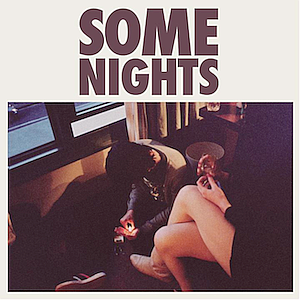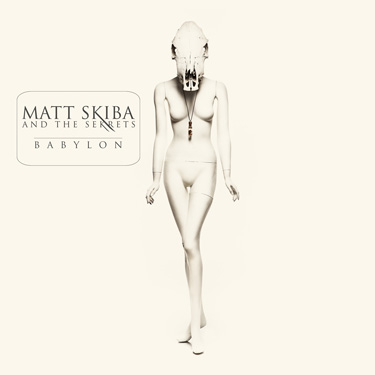 To their credit, Arcade Fire thinks about every possible angle when it comes to their music. Perhaps other artists do too, but they make that creative anguish invisible to the common listener. Arcade Fire, on the other hand, make it strikingly apparent as they present fully formed works as a testament to their process. And the fans love them for it. Maybe it stems from the way they make 70s style concept albums cool and digestible, or maybe it’s their rag-tag instrumental make up.
To their credit, Arcade Fire thinks about every possible angle when it comes to their music. Perhaps other artists do too, but they make that creative anguish invisible to the common listener. Arcade Fire, on the other hand, make it strikingly apparent as they present fully formed works as a testament to their process. And the fans love them for it. Maybe it stems from the way they make 70s style concept albums cool and digestible, or maybe it’s their rag-tag instrumental make up.
Maybe it says something about their perceived authenticity.
Whatever the reason, you’d be hard-pressed to hear a piece of music from Arcade Fire that wasn’t carefully composed, arranged, and conceptualized.
Their latest album, The Suburbs, is another entry in the line of three heavily throughout lamentations on the battle for the American spirit. With 16 tracks to work with, The Suburbs attempts to display the painful process of watching innocence decay, setting it all to a mix of richly layered soundscapes that try to envelop the listener.
Suffice to say, there are a lot of pieces to The Suburbs, but what’s immediately striking about the overall whole is how subdued the tracks are. There is no epic slash-and-burn or call-to-arms in the vein of Funeral’s “Wake Up” or Neon Bible’s “Intervention.” Instead, the closest The Suburbs comes to that is in the rock n’ roll fuzz and galloping ramble of “Month Of May,” which doesn’t arrive until the album’s latter half.
By and large, The Suburbs is a slow burning record throughout, compartmentalizing its music in a mid-tempo fog.
This doesn’t mean the music is boring; the album’s title track opens things up with a jumpy piano line and shuffling back beat, while the late album cut “Deep Blue” makes careful use of lazy acoustic guitar, stompy distortion, and ghostly backing vocals. However, this is how ALL the arrangements unfold, with very few songs coming across as lean or urgent. Songs tend to run together, especially in the album’s middle, and while each track blooms into the next with calculated precision, the album’s slower moving moods will test even the most observant listener.
While the The Suburbs is built on arrangements that lay layers upon layers of rich instrumentation, there’s not a great deal of separation between these instruments. Instead, the music on The Suburbs seems to be buried in a gauzy miasma, where the individual sounds climb upwards and bleed into each other. While the effect works for the strident strings and twisting theatrics of “Empty Room,” other cuts, like the ascending “City With No Children,” and the meandering “Half Light II (No Celebration)”get lost in the thematic shuffle. Yet ultimately, it’s clear that the hazy cloud wrapping around these melodies is supposed to evoke some sense of a dreamscape where our characters dwell, a symptom of the album’s concept rather than poor production.
Interestingly enough, it’s here that The Suburbs shines brightest, for it’s general concept often comes across as more engaging than the music.
Win Butler aims to tell a story about wide-eyed youths living their lives in the perfection of their dreams. On cuts like “Modern Man,” Butler’s high strung wail laments, “So I wait my turn/I'm a modern man/And the people behind me/They can't understand…” showing us the romance that comes from such a secret and special places. Unfortunately, these dreamers must come back to reality, and it’s the realization that they must eventually become similar to those that structured the world before them that makes The Suburbs such an interesting concept album.
While Butler romanticizes the suburbs as a place these dreamers have created to reject the intolerance and dangers of the world at large, he’s a ruthless author as he displays their maturation as the cause of innocence lost, and the ultimate undoing of their dream world. The realization is a sobering one on “Sprawl (Flatland)” where Butler sings, “Said, well where do you kids live?/Well sire, if you only knew/What that answer’s worth/Been searching every corner/Of the earth…” Coupled with the disc’s transition into a more electronic infused sound as opposed to the first half’s folksier tendencies, and it’s clear that the Arcade Fire’s planning all went into conceptualizing these grand sweeping statements.
Too bad it takes listeners a lifetime to get there.
The main problem with The Suburbs is that it’s overworked. For every solid number like the throbbing synth soaked “Sprawl II (Mountains Beyond Mountains)” there’s equally floundering ones in the repetitive “Rococo.” The group could have easily cut a few songs and kept the strongest melodies, allowing listeners to become invested in The Suburbs much more immediately. As it stands, the group has come up with a bloated record, a batch of songs that never really climaxes, even though there’s plenty going on.
And perhaps that’s the point, for real life never climaxes they way we’d expect it to either. Perhaps, in their infinite wisdom, the Arcade Fire has created the perfect concept album to parallel the shadow of adulthood. Throughout all their existential ennui, maybe they’ve found a way to display the feeling one has when life stops being in front of them, and starts residing behind them.
Maybe on paper, they’ve planned the perfect album, while in reality, they’ve simply recorded a good one.
Key Cuts: The Suburbs, Deep Blue, Sprawl II (Mountains Beyond Mountains)
Sounds Like: Revolver (The Beatles), In The Aeroplane Over The Sea (Neutral Milk Hotel), Rattle & Hum (U2)
Click on the artwork to sample The Suburbs for yourself!
How Does British Athletic Performance Impact National Identity?
-
Influence of Athletic Performance on National Identity Athletic performance
deeply intertwines with national identity, shaping how citizens feel about
thei...
3 months ago














2 comments:
I love Arcade Fire, and will totally be leaving better comments soon, but I'm catching up from my move. I just wondered is "This song starts a craze" in reference to Brand New? Because that's all I can think of.
Thanks for the love Jeanette! It's always nice to know there are readers out there that actually read. Real life can be stressful, so thanks for spending a little bit of it here. :)
And yes, my blog name is a direct reference to "Okay, I Believe You But My Tommy Gun Don't." What can I say? I'm a fan!
Post a Comment